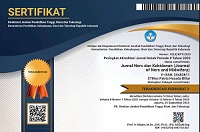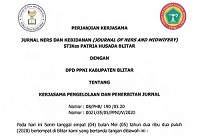Kualitas Hidup Pasien Gagal Ginjal yang Menjalani Hemodialisis
DOI:
https://doi.org/10.26699/jnk.v3i2.ART.p118-122Keywords:
Quality of Life, Renal Failure, Hemodialysis.Abstract
Chronic renal failure (CRF) is a public health problem in the world and is now recognized as common diseases with risk of hemodialysis therapy. Hemodialysis can have an impact to the patient quality of life. The aim of the research was to describe the patient quality of life with renal failure underg hemodialysis at Mardi Waluyo Blitar hospital. The research used a descriptive research design. The population was all patients with renal failure which registered in Hemodialysis of Mardi Waluyo Blitar hospital on October-December 2014 as many as 84 patients. The sample was 34 patients selected by accidental sampling. The data collection was conducted on March 30th – April 4th, 2015. The data collecting used questionnaires of The World Health Organization Quality of Life (QoL WHO) which described physical health, psychological, social relationships, and environment. In general the quality life of renal failure patient underrgo hemodialysis in bad category was 55.9% (19 patients). This condition was due to a chronic disease and its complications potentially stressors including renal failure patient. Stressors that arise caused by environmental conditions, psychological state, and physical health. The study recommended that health services were expected to provide comfortability, improve maintenance functions, improve interpersonal relationships, and counseling.References
Azwar, S. 2010. Sikap Manusia dan Pengukurannya.
Yogyakarta: Pustaka Belajar
Bakewell, A.B., Higgins, R.M., & Edmunds, M. 2001.
Kydney International. 8 November 2014. http://
www.nature.com/ki/journal/v61/n1/full/4492725
a.html
Bakta, I, M & Suastika, K, M. 1999. Gawat Darurat di
Bidang Penyakit Dalam. Jakarta: EGC.
Betz, L.C., & Sowden, L.A. 2009. Buku Saku Keperawatan
Pediatri. Jakarta: EGC
Brunner & Suddarth. 2000. Keperawatan Medikal
Bedah: Buku Saku. Jakarta: EGC.
Broker C. 2008. Ensiklopedia Keperawatan. Jakarta:
EGC.
Colvy, J. 2010. Gagal Ginjal Tips Cerdas Mengenali &
Mencegah Gagal Ginjal. Yogyakarta: DAFA Publishing.
Doengos, M, E. Moorhouse, M, F. Geissler, A.C. 2000.
Rencana Asuhan Keperawatan Pedoman untuk
Perencanaan dan Pendokumentasian
Perawatan Pasien. Jakarta: EGC.
Ferrans, C.E. & Powers, M. Description of the Quality of
Life Index (QLI). 8 November 2014. https://www.
uic.edu/orgs/qli
Ibrahim, K. 2009. Kualitas Hidup Pasien Gagal Ginjal
Kronis yang Menjalani Hemodialisis. 8 November
Notoadmodjo. 2010. Ilmu Kesehatan Masyarakat
Prinsip- Prinsip Dasar. Jakarta: Rineka Cipta.
Sathvik, B.S., Parnathasarathi, G., Nahari, M.G., Gunder,
K.C. 2008. An assessment of the Quality of Life in
Hemodialysis Patients Using the WHO QoLBREF
Questionnaire. 8 November 2014. http://
www.indianjnephrol.org
Sjamsuhidayat, R., & Jong, W.D. 2010. Buku Ajar Medikal
Bedah. Jakarta: EGC.
Tapan, E, M. 2004. Penyakit Ginjal dan Hipertensi.
Jakarta: PT Gramedia.
WHO. 1993. Quality of Life –BREF. 8 November 2014.
http://who.int/substance_abuse/research_tools?
whoqolbref/en
Wijaya, A.S & Putri, Y.M. 2013. KMB 1 Keperawatan
Medikal Bedah Keperawatan Dewasa.
Yogyakarta: Nuha Medika.
Young, S. 2009. Rethinking and integrating nephrology
palliative care: A nephrology nursing perspective.
November 2014. http://www.proquest.
umi.com
Downloads
Published
How to Cite
Issue
Section
License
Copyright (c) 2016 Jurnal Ners dan Kebidanan (Journal of Ners and Midwifery)

This work is licensed under a Creative Commons Attribution-ShareAlike 4.0 International License.






